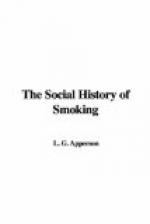The frowns and remonstrances of Quarterly and Monthly Meetings of Friends had not succeeded in putting the Quakers’ pipes out. In a list of sea stores put on board a vessel called by the un-Quaker-like name of The Charming Polly, which brought a party of Friends across the Atlantic from Philadelphia in 1756, we find “In Samuel Fothergill’s new chest ... Tobacco ... a Hamper ... a Barrel ... a box of pipes.” The provident Samuel was well found for a long voyage.
The non-smokers were the men of fashion and those who followed them in preferring the snuff-box to the pipe. Sometimes, apparently, they chewed. A World of 1754 pokes fun at the “pretty” young men who “take pains to appear manly. But alas! the methods they pursue, like most mistaken applications, rather aggravate the calamity. Their drinking and raking only makes them look like old maids. Their swearing is almost as shocking as it would be in the other sex. Their chewing tobacco not only offends, but makes us apprehensive at the same time that the poor things will be sick,” as they certainly well deserved to be. To chew might be “manly,” but it will be observed that smoking is not mentioned. No reputation for manliness could be achieved by even the affectation of a pipe. Similarly, in Bramston’s “Man of Taste,” various fashionable tastes are described, but there is no mention of tobacco.
In Townley’s well-known two-act farce “High Life Below Stairs,” 1759, the servants take their masters’ and mistresses’ titles and ape their ways. The menservants—the Dukes and Sir Harrys—offer one another snuff. “Taste this snuff, Sir Harry,” says the “Duke.” “’Tis good rappee,” replies “Sir Harry.” “Right Strasburgh, I assure you, and of my own importing,” says the knowing ducal valet. “The city people adulterate it so confoundedly,” he continues, “that I always import my own snuff;” and in similar vein he goes on in imitation of his master, the genuine Duke. These servants copy the talk and style (with a difference) of their employers; but smoking is never mentioned. The real Dukes and Sir Harrys took snuff with a grace, but they did not do anything so low as to smoke, and their menservants faithfully aped their preferences and their aversions.
Negative evidence of this kind is abundant; and positive statements of the aversion of the beaux from smoking are not lacking. Dodsley’s “Collection” contains a satirical poem called “A Pipe of Tobacco,” which was written in imitation of six different poets. The author was Isaac Hawkins Browne, and the poets imitated were the Laureate Cibber, Philips, Thomson, Young, Pope, and Swift. The first imitation is called “A New Year’s Ode,” and contains three recitatives, three airs and a chorus. One of the airs will suffice as a sample:
Happy mortal! he who knows Pleasure which a Pipe bestows; Curling eddies climb the room Wafting round a mild perfume.
Number two, which was intended as a burlesque of Philips’s “Splendid Shilling,” is really pretty and must be given entire. It reveals unsuspected beauties in the simple “churchwarden,” or “yard of clay”:




